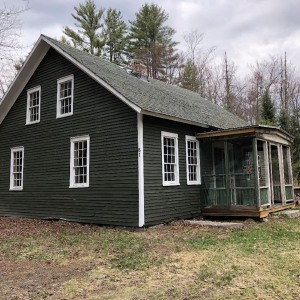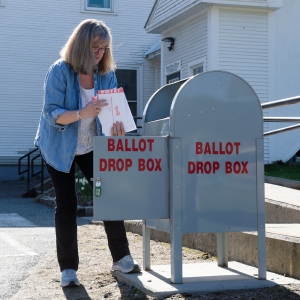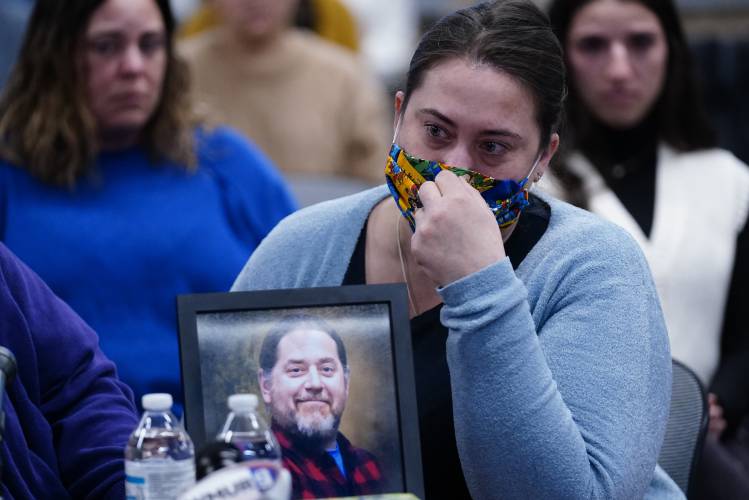Column: New Hampshire lawmakers ignore obvious gun safety measures
| Published: 02-09-2024 4:35 PM |
Monday’s Valley News featured two articles describing gun control legislation under consideration this year in New Hampshire.
As part of the majority of voters who seek stricter gun control, I am frustrated and bewildered by the incremental approach these laws take. Instead of debating laws that limit the acquisition of military grade weapons designed to kill humans, the New Hampshire Legislature will be considering “flag” laws that might enable police to confiscate weapons from individuals whose mental health problems pose a danger to themselves and others. Before legislators spend endless hours debating “flag” laws they should examine how these measures have played out in other states and look at findings showing the public’s desire to limit access to guns.
The recent investigation of the mass shooting in Lewiston, Maine offers some insights into the limitations of “flag” laws in the real world. A Dec. 23 article by Nick Stocio in the Boston Globe described the practical problems law enforcement officials in Maine faced implementing the “flag” law in that state. Months before Robert Card carried out the mass shooting in Lewiston late last year, Sagahadoc County Sheriff’s Sergeant Aaron Skolfield was made aware of Card’s instability from numerous sources, including members of his family and those serving with him in a National Guard unit.
In a conference between Skolfield and Card’s Army Reserve Captain, Jeremy Reamer, before the shootings, Skolfield expressed his concern that confronting Card might “throw a stick of dynamite into a pool of gas and make things worse.” After deliberating over how to manage Card’s condition, both the local sheriff and Army Reserve captain decided to accept the assurances of Card’s brother, who stated he “would “work with” his brother to ensure that he does not have any firearms except for those in the family gun safe at the (family) farm.”
In the Globe article, Skolfield noted that the Cards were a “big family in this area,” and said he didn’t want the police visits to their homes to be publicized, promising to keep unfavorable information about Card off the police radio.
As one who lived and worked in public schools in rural Maine, I understand the good faith response of the sheriff’s sergeant and the Army Reserve captain. Given their personal experience with Card and their understanding of the ethos of tightly knit rural communities in New England, it is not surprising that they preferred to work with the families of the troubled individual instead of having a potentially dangerous confrontation.
Moreover, the implementation of “flag” laws is especially complicated in smaller rural communities given the paperwork required to get sign offs from mental health officials and/or judges. The bottom line is that confiscating weapons from gun owners is far more difficult than preventing their purchase, especially given voter support for restricting gun ownership. Fox News — hardly a liberal media outlet — conducted a poll in April 2023 and gathered the following data on gun control:
■87% of voters surveyed said they support requiring criminal background checks for all gun buyers.
Article continues after...
Yesterday's Most Read Articles
 Dartmouth administration faces fierce criticism over protest arrests
Dartmouth administration faces fierce criticism over protest arrests
 Hanover house added to New Hampshire Register of Historic Places
Hanover house added to New Hampshire Register of Historic Places
 Sharon voters turn back proposal to renovate school
Sharon voters turn back proposal to renovate school
■77% support requiring a 30-day waiting period for all gun purchases.
■81% support raising the legal age to buy guns to 21.
■80% support requiring mental health checks for all gun purchasers.
■80% say police should be allowed take guns away from people considered a danger to themselves or others.
■61% of voters support banning assault rifles and semi-automatic weapons.
The Giffords Law Center, which advocates stricter gun control, notes that New Hampshire has not passed any meaningful gun safety laws in years. Instead, our state recently enacted a law that allows people to carry loaded, hidden handguns in public without a background check or permit. It noted that New Hampshire also lacks universal background checks, gun owner licensing, extreme risk protection orders, assault weapon restrictions, a large capacity magazine ban, and waiting periods. Given the Fox survey findings and the Giffords Center’s findings, there is broad support for five measures that would not require the confiscation of any weapons and would be relatively easy to implement:
■Requiring comprehensive criminal checks for all gun buyers.
■Requiring mental health checks for all gun purchases
■Requiring a 30-day waiting period for all gun purchases (which would help assure the background and mental health checks could be completed)
■Raising the age to purchase a gun (there is currently no minimum age)
■Banning future purchases of assault rifles and semi-automatic weapons.
Instead of tackling and debating complicated requirements to confiscate guns, our legislators might make more headway by addressing these popular and straightforward changes to the acquisition of guns.
In the meantime, New Hampshire is spending millions to make public spaces safe. In 2017, the last year such data is available, New Hampshire school districts spent over $8.9 million on school resource officers and security guards. Since 2018, the state has spent $5.3 million on “safe learning environments.” Despite these expenditures, children and parents do not feel more secure. According to a national Pew Research survey conducted in October 2022, 32% of parents with at least one child younger than 18 say they are “very or extremely worried” about a shooting ever happening at their children’s school. And the Fox News survey cited above indicates that safety concerns are not limited to parents: 51% of the voters surveyed said that they worry that they or their loved ones could be victims of gun violence.
We ask school employees and volunteers to get and pay for security checks. We require licenses for vehicles of all kinds and have age limits on when youngsters can drive them and, at this point, do not offer any driving permits for tanks designed for warfare. Why not impose the set of standards on those purchasing weapons, especially those who want to acquire weapons designed for battlefields?
Wayne Gersen lives in Etna.



 Editorial: Response to campus protests only adds fuel to the fire
Editorial: Response to campus protests only adds fuel to the fire Editorial: Chris Sununu’s moral vacuum
Editorial: Chris Sununu’s moral vacuum Editorial: Gambling tarnishes America’s sporting life
Editorial: Gambling tarnishes America’s sporting life By the Way: A white nationalist’s many mistruths
By the Way: A white nationalist’s many mistruths
